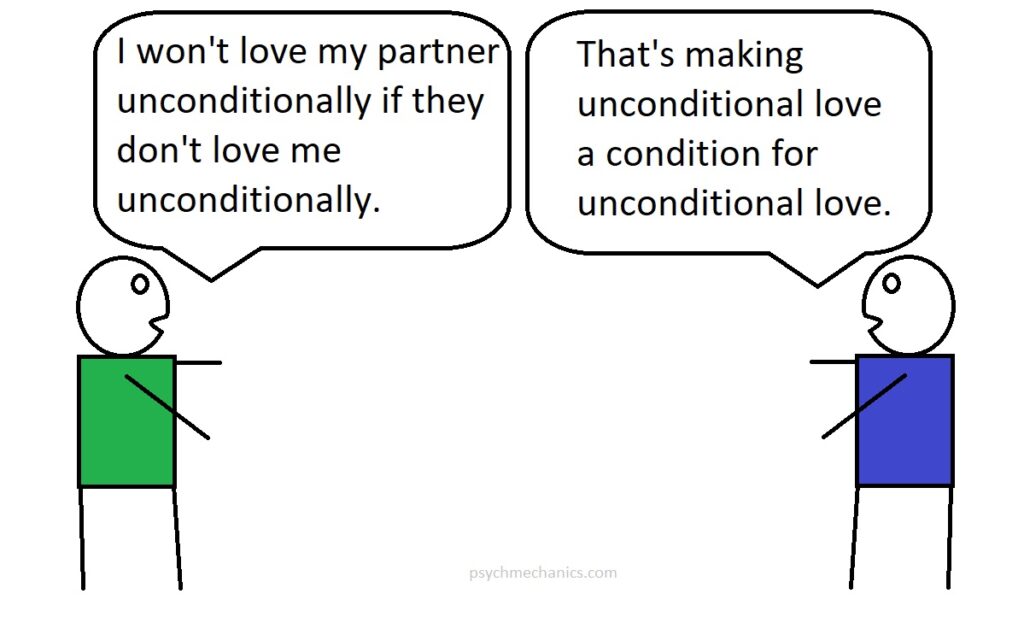“Why does my husband hate me so much?”
“Why does my husband hate me all of a sudden?”
If questions like these are doing rounds in your head, it’s time to step back and analyze what’s going on.

There are two possibilities:
- You’re wrong in thinking your husband hates you (more likely)
- You’re right in thinking your husband hates you (less likely)
Let’s explore the psychology behind these scenarios:
Scenario 1: You’re wrong
Let me ask you this:
“Why do you think your husband hates you?”
Your response would probably consist of the details of a recent event where you felt wronged by him.
Now let me ask you this:
“Is it fair to conclude that your husband hates you based on this single event?”
“What about all those times in the past when he was very loving towards you?”
Our minds have what’s called the recency bias. We give more weight to recent events. Ancestors who paid more attention to what just happened over what happened in the past were more likely to survive.
If you hear a rustling in the bushes and start dwelling on the past, you’re more likely to get eaten by a predator.
If you think your husband hates you based on what he did recently, let’s get this bias out of the way. ‘Hate’ is a strong word that shouldn’t be thrown around lightly. One recent mistake your husband made doesn’t prove he hates you.
The enemy
Recency bias plays out prominently in our social interactions. It sways our allegiances and enmities like a leaf in the wind. One recent positive action from someone makes you think they’re your friend. You forget their past vices.
Similarly, one recent negative action from someone makes you think they’re your enemy. You forget their past virtues.
When we’re stressed or threatened, this bias only gets worse. We enter into ‘alert mode’ and scan our environment for threats. That includes perceiving harmless behaviors from your spouse as threatening.
Out of all the possible reasons contributing to your partner’s perceived harmful behavior, you select the one that convinces you they’re your enemy.1Beck, A. T. (2002). Prisoners of hate. Behaviour Research and Therapy, 40(3), 209-216.
This creates a cycle of hate. Your partner does something harmless that you perceive as harmful. When you are harmed, you try to harm them back. When you are harmed, they hurt you back—intentionally this time.
If you want to get out of this mess, it’s best to remember not to judge others based on just one action. You need a pattern of behavior before you can conclude that your husband hates you.
Communication is a superpower when it comes to clearing such misperceptions and misunderstandings. If you feel wronged, communicate your feelings to him assertively and try seeing where he’s coming from.
Scenario 2: You’re right
If your husband consistently shows malicious behavior towards you, you have cause for concern. You have a pattern of behaviors to look at, and you’re not falling into the trap of any bias.
This begs the question of why your husband hates you. It could have something to do with you or him. Hatred– the opposite of love- is an emotion that motivates us to avoid people or situations that harm us.
Some things have to be present in a relationship to make it work. These things increase love in a relationship, and their absence increases hatred. The key ingredients of a loving relationship are:
- Trust
- Interest
- Respect
- Attention
- Effort
- Intimacy
- Communication
- Empathy
- Support
For a relationship to blossom, both partners must keep watering these seeds. Each has to do their part to ensure that these things don’t drift away from the relationship.
These ingredients of a healthy relationship create a perception of equality for both partners. Both partners believe they’re giving as much as they’re receiving. The relationship becomes unequal when one partner starts to withdraw one or more of these things.
The other feels wronged and resentful. The cycle of hatred begins.
Just like a seed needs proper conditions to grow, these are the conditions for love. There’s no such thing as unconditional love.

Let’s narrow down things you might have done and things related to your husband that might have contributed to his hatred for you.
Things you might have done
1. Neglecting
If you’ve stopped giving your husband as much time and attention as you used to, he may have grown resentful. His neglecting of your needs may be a response to your neglecting of his needs.
2. Selfishness
Selfishness kills empathy in a relationship. Your greed may have turned your husband against you.
3. Controlling
If you micromanage every little aspect of your husband’s life, it may have suffocated him. His hatred is a way for him to get some space.
4. Lying and cheating
Break trust in a relationship.
Things having to do with him
1. Stress
He might have been stressed and overwhelmed at work. When we’re stressed, we snap at people because we want to allocate more cognitive resources toward the source of our stress.
Under such circumstances, even our partner’s harmless behaviors can be seen as harmful. Under stress, the mere presence of your partner can be overwhelming.
“Shut up!”
“Go away!”
“Get away from me!”
2. He feels wronged (or feels you intend to wrong him)
You may have intentionally or unintentionally hurt him.
3. He thinks he’s giving more than receiving
Injustice breeds hatred.
4. He thinks you’re coming in the way of his other life goals
He may be experiencing difficulty balancing his career and relationship.
5. He has trust issues
He may have been betrayed in the past.
6. He’s a sociopath
He frequently indulges in anti-social activities, and you’re just another victim.
7. He’s projecting his past onto you
If you find that your husband hates you for no reason, it may be that he’s projecting his past relationships onto you. For instance, if his ex was terrible at arguing, he may avoid all arguments with you. Even if you’re not like his ex and can argue in healthy ways.
8. He thinks you’re not worthy of him
To him, the opportunity cost of being with you may be too high. He may resent that he has to be with you when he could’ve been with someone better.
9. He thinks he’s not worthy of you
His hatred stems from insecurity and low self-esteem. Hating you and calling you unworthy is a defense mechanism to prevent you from discovering how unworthy he really is.
10. He’s considering leaving you
He’s showing hatred, so you can have a legitimate excuse to end the relationship- something he wants anyway.
